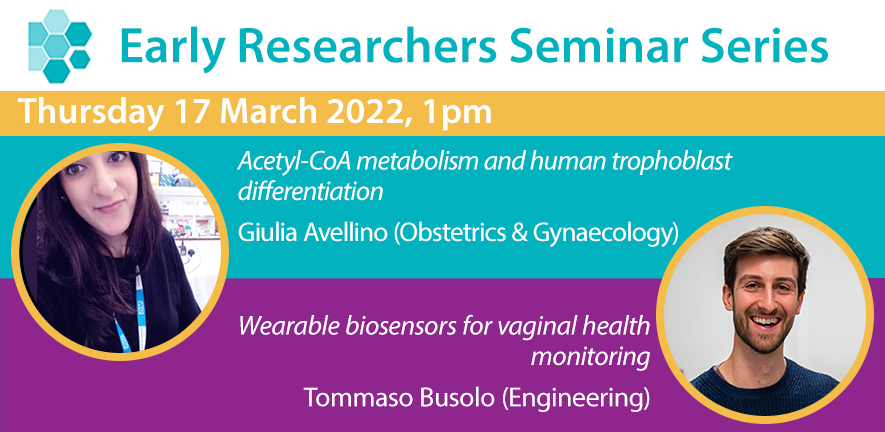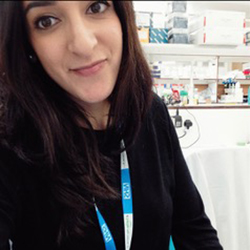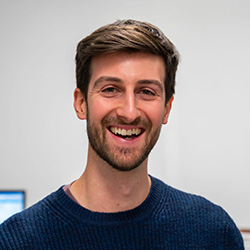
Thursday 17 March 2022, 1pm - 2pm
Acetyl-CoA metabolism and human trophoblast differentiation
Giulia Avellino (Obstetrics & Gynaecology)
Wearable biosensors for vaginal health monitoring
Tommaso Busolo (Engineering)
Chair: Sophie Kitching (MRC Toxicology Unit)
Meeting link
Please register on Eventbrite to receive the Zoom meeting details (they will be available a couple of days before the seminar.
Speakers and abstracts
Acetyl-CoA metabolism and human trophoblast differentiation
Giulia Avellino (Obstetrics & Gynaecology)
During early placental development, trophoblasts face diverse metabolic challenges including nutrient and oxygen limited environments. It is also the period at which vast changes in gene expression coincide with metabolic reprogramming. In addition to the vital role of metabolism in fulfilling bioenergetic and biosynthetic needs, emerging evidence suggests a link between metabolism and epigenetic processes. We aim to understand the molecular mechanisms linking cellular metabolism and epigenetic programs directing trophoblast proliferation and differentiation. Our hypothesis is that acetyl-CoA metabolism regulates the coordination of trophoblast proliferation and differentiation by regulating the availability of acetyl-CoA for histone acetylation. The findings from my research will establish the underlying mechanisms by which metabolism influences epigenetic networks to regulate trophoblast fate, and lead to a greater understanding of how early placental metabolism influences placental development and fetal growth.
Giulia Avellino is a second year PhD student in the Department of Obstetrics and Gynaecology at the University of Cambridge, supervised by Dr Irving Aye and Prof Stephen Charnock-Jones. She previously completed her Masters’ degree at the University of Catania. Prior to start her PhD, Giulia joined the Department of Obstetrics and Gynaecology with support from the Erasmus Plus traineeship program where she studied placental polyamine metabolism and histone acetylation. Her work resulting from this period was submitted as an abstract to the Society for Reproductive Investigations Meeting in Vancouver, where she was awarded with the President’s Plenary Award. Her PhD research investigates the role of acetyl-CoA metabolism during human trophoblast proliferation and differentiation.
Wearable biosensors for vaginal health monitoring
Tommaso Busolo (Engineering)
Vaginal health has been systematically neglected due to a combination of taboo, inadequate policy, and funding, contributing to continued poor health outcomes for females. In particular, vaginal infections such as bacterial vaginosis impact over 25% of females, causing pain, poor mental health and doubling the risk of STIs and preterm birth.
A crucial factor in vaginal health is the vaginal microbiota as it enables the prevention of vaginal conditions. However, keeping a healthy microbiota is challenging because its composition can vary daily, influenced by factors such as hygiene products, sexual activity and medications. Currently, there are no options for affordable at-home vaginal microbiota testing.
Our project is developing a smart pad with integrated wearable biosensors that enable affordable vaginal microbiota testing at home. This solution could prevent infections, improve treatment efficacy or facilitate access to medical advice.
Tommaso Busolo is a NanoDTC Translational Prize Fellow in the Department of Engineering. He is currently developing wearable biosensors that enable the vaginal microbiome to be readily tested in at-home or point-of-care settings. This tool could be used for preventing infections and improving treatment efficacy, particularly by patients suffering from recurrent infections. Before his fellowship, he carried out doctoral research in Cambridge, investigating how we can use human body energy (i.e. motion and heat) to power wearable biosensors by developing energy harvesting smart textiles and stretchable devices that can be seamlessly integrated into clothes
The Early Researchers Seminar Series (ERSS) is a platform for PhD Students and early career researchers (ECRs) at the University of Cambridge with research foci on reproduction to share and discuss their research with other academics from a range of disciplines also researching reproduction at the University. Seminars are held on Zoom on the third Thursday of every month, 1pm - 2pm. For more information, and for the full 2021 - 2022 programme, please see the main ERSS page.



